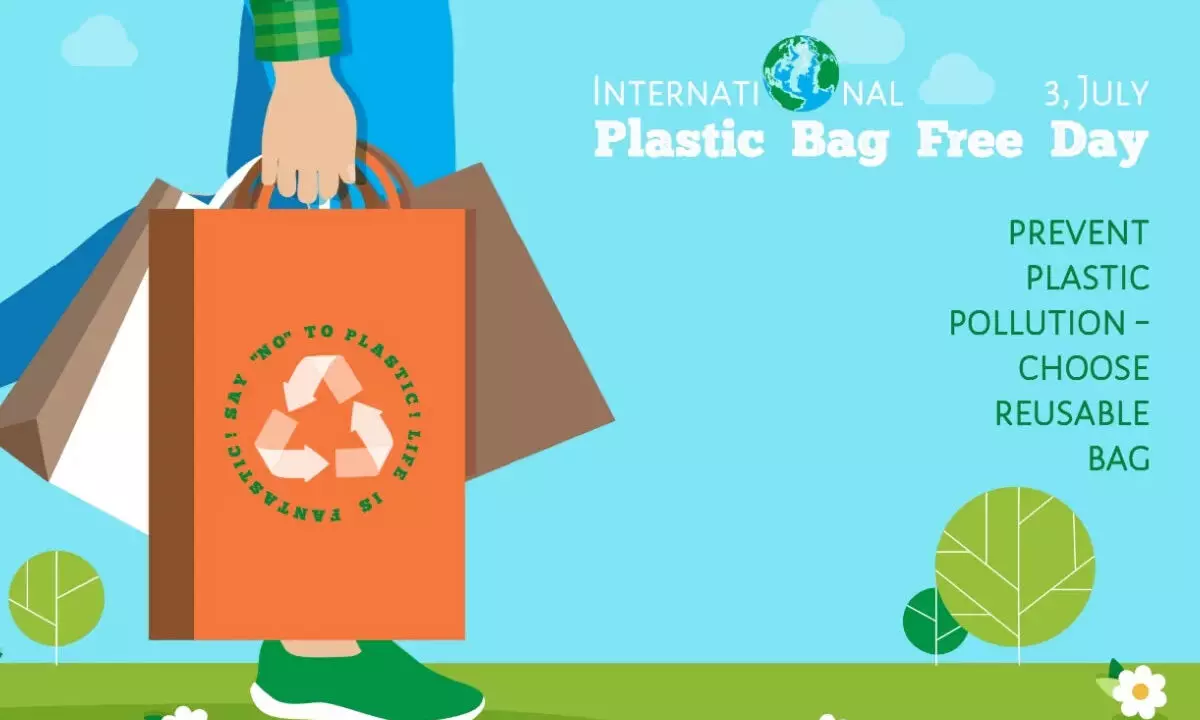Live
- WPL 2025: Matthews, Sciver-Brunt and Harmanpreet carry MI to massive 213/4
- MLA Anirudh Reddy Accuses KTR of Involvement in Manhattan Project Scam
- TGPSC Clarifies on False Propaganda Regarding Group-1 Recruitment
- Hyderabad Police Ensures Security as Holi and Ramadan's Second Friday Coincide
- Five MLCs Elected Unopposed in Telangana Under MLA Quota
- Sambhal prepares for a peaceful Holi with tightened security and special patrols
- CNG, PNG prices to become cheaper in Rajasthan from March 14
- Anti-Rape ad to screen in theaters before movies, like health advisories
- Prodigy Finance Offers Three Scholarship Awards totalling an amount of $19,000 for Global Students Starting Fall 2025
- Champions League drama likely to affect La Liga with big games this weekend
Celebrating International Plastic Bag Free Day 2024: History, Importance, Inspirational Quotes, and Travel Tips to Reduce Plastic Use


International Plastic Bag Free Day is observed on July 3 each year to highlight the issue of plastic pollution and its detrimental effects on the environment
International Plastic Bag Free Day is observed on July 3 each year to highlight the issue of plastic pollution and its detrimental effects on the environment. This day encourages both individuals and governments to take actionable steps to reduce plastic use and protect ecosystems, particularly those impacted by plastic waste.
History of International Plastic Bag Free Day
The inaugural International Plastic Bag Free Day was launched on July 3, 2008, by Rezero, a member of Zero Waste Europe (ZWE). Initially celebrated in Catalonia, Spain, the observance expanded in 2009 when ZWE introduced it to the European Union. Persistent advocacy by ZWE has led numerous governments to adopt measures aimed at decreasing single-use plastic consumption, cementing this day as a global call to action against plastic bag usage.
Significance of International Plastic Bag Free Day
This day is pivotal in raising awareness about the environmental hazards posed by plastic bags. It serves as a critical reminder to individuals, communities, and governments worldwide about the necessity of reducing plastic pollution. By promoting sustainable practices and policies, International Plastic Bag Free Day strives to minimize the use of single-use plastics, thereby safeguarding ecosystems, wildlife, and human health. The overarching goal is to foster global cooperation for a cleaner and healthier planet for present and future generations.
Memorable Quotes on Plastic Pollution
1. “It does seem really hard to get consumers to do the right thing. It is stupid that we use two tons of steel, glass, and plastic to haul our sorry selves to the shopping mall. It’s stupid that we put water in plastic bottles in Fiji and ship it here.” – John Doerr
2. “Of all the waste we generate, plastic bags are perhaps the greatest symbol of our throwaway society. They are used, then forgotten, and they leave a terrible legacy.” – Zac Goldsmith
3. “Not only are plastics polluting our oceans and waterways and killing marine life – it’s in all of us and we can’t escape consuming plastics.” – Marco Lambertini
4. “Plastic pollution is beyond repair. It is time to act now and save our planet.” – Leonardo DiCaprio
5. “Pollution from oil and gas development, toxic runoff, and miles and miles of plastic trash foul the waters and threaten marine life.” – Frances Beinecke
Tips for Reducing Plastic Use While Traveling
1. Use Reusable Water Bottles and Bags
Opt for a reusable water bottle instead of purchasing single-use plastic bottles. Refill it at filtered or tap water stations. Additionally, carrying a foldable reusable shopping bag eliminates the need for plastic bags during grocery shopping.
2. Carry Your Cutlery
Bring your own reusable bamboo or metal utensils to avoid using disposable plastic cutlery. This practice can be extended to include reusable straws if you prefer using them.
3. Use a Bamboo or Wooden Toothbrush
Switching to a bamboo or wooden toothbrush is an effective step towards reducing plastic use. These alternatives are affordable and environmentally friendly.
4. Choose Eco-Friendly Accommodations
When selecting hotels, resorts, or guesthouses, be conscious of your consumption habits. Request refillable water instead of single-use plastic bottles and avoid plastic amenities in bathrooms. Encourage these establishments to minimize single-use plastic items on their premises.
5. Use a Menstrual Cup
For women travellers, a reusable menstrual cup is an excellent zero-waste alternative to tampons and pads. It significantly reduces the plastic waste generated by conventional menstrual products.
By adopting these practices, travellers can contribute to the global effort to reduce plastic pollution and protect the environment.

© 2025 Hyderabad Media House Limited/The Hans India. All rights reserved. Powered by hocalwire.com






